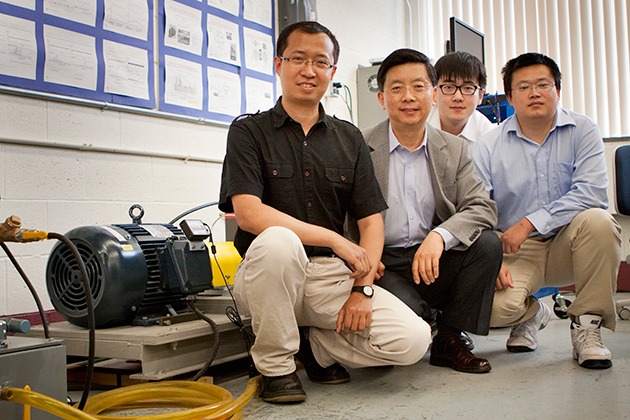
Robert X. Gao, the Pratt & Whitney Chair Professor in the Department of Mechanical Engineering, and his colleagues have received a three-year National Science Foundation grant to support collaborative research aimed at improving spare parts inventory management in the aircraft industry.
UConn shares this three-year, $450,000 award with Rensselaer Polytechnic Institute and the University of Massachusetts at Amherst. Pratt & Whitney is the industry partner on the project.
The grant is part of the NSF’s GOALI program (Grant Opportunities for Academic Liaison with Industry), which is intended to catalyze industry-university partnerships and help ensure that “intellectual capital and emerging technologies are brought together in ways that promote economic growth and an improved quality of life.”
The models and methods will be beneficial to a wide array of manufacturing firms for whom after-sale service is a critical component of their business.
The goal of Gao’s project is to develop the basic science and practical tools to transform sensor measurements collected from a large number of distributed machines (such as jet engines) in the field into forecasting methodologies – along with inventory policies – for the spare parts required to maintain the equipment. The researchers, aided by their colleagues at Pratt & Whitney, will pursue four lines of research:
- Develop advanced sensing and signal interpretation methods to diagnose the health status of specific engine parts before they require replacement (the prevailing techniques indicate only the overall health of an engine);
- Develop models that transform measurement data into predictions of time-to-overhaul and resource requirements;
- Develop algorithms that forecast part needs, and inventory policies that aggregate this information across equipment, taking into account field usage and economic conditions;
- Create a simulation tool for the monitoring and maintenance of a large fleet to validate the methodology.
The research is expected to culminate in improved forecasting and inventory management for commercial engine spare parts.

Beyond these specific technical advancements, the project will “determine the economic impact of advanced sensing and predicting methodologies and the resulting improvement in decision-making, and potentially make the case for their pervasive installation,” says Gao. “Although the developed models will primarily be validated within Pratt & Whitney’s business units, the models and methods will be beneficial to a wide array of manufacturing firms for whom after-sale service is a critical component of their business.”
In addition to this GOALI research, Gao, who joined the UConn faculty in 2008, has received several other NSF grants that focus on advancing the science base of sensing physics for advanced manufacturing (such as electrically-assisted precision micro-rolling and multivariate injection molding control), and building the cyber-physical infrastructure for a “Smart City.”


